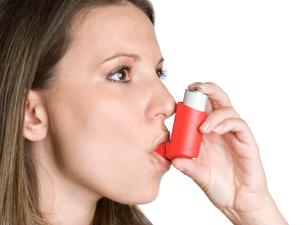Feature Story
Health Center Today, July 27, 2011
Summertime Asthma Triggers – What You Can Do to Prevent an Attack
By Carolyn Pennington

Summertime can be prime time for asthma attacks. More Americans than ever before say they are suffering from asthma. In fact, asthma and allergies impact 1 out of 4 Americans. It is one of this country's most common and costly diseases.
Health Center pulmonologist, Dr. Jennifer Kanaan, says certain summertime triggers can prompt an asthma attack.
1) Heat and humidity
2) Pollution (smoke from cook-outs and ozone layer rays)
3) Chemicals (chlorine in swimming pools or cleaning products)
4) High pollen and mold content
Asthma triggers cannot always be prevented. However, there are many ways to reduce summer induced asthma attacks.
- Pay attention to pollen counts for your area.
- When pollen counts are high, stay indoors as much as you can. Pollen counts tend to be highest on warm, windy days and lowest on rainy days. If you must go outdoors during times when pollen counts are high, try to do it later in the day, as counts are usually highest early morning to midday.
- When you're indoors or in the car, keep the windows closed and air conditioning on. Even if it's not hot out, turning on the A/C will keep pollen from blowing into your home or car through the window, especially if the air conditioning unit is equipped with a HEPA filter.
- Vacuum and dust your house's flat surfaces frequently. Dust collects on flat surfaces and pollen often collects in dust, so cleaning will keep the levels down indoors too. It may help to wear a mask while you clean.
- Don't hang drying clothes outdoors. Clothes hanging outside to dry can collect pollen. Use a clothes dryer when pollen levels are high.
- If you must go outside during high pollen counts, wash the pollen off when you get back inside. Wash your hair to get rid of pollen and change your clothes. This might seem like overkill, but it can make a big difference in your symptoms.
There are a number of medications that can be used to treat summer allergies and asthma. For asthma, you should be taking your inhaled steroid every day as prescribed to prevent symptoms, and using your rescue inhaler if symptoms do arise. If you need to use it twice a week or more, though, it's time to call the doctor for a more effective preventive medicine.


